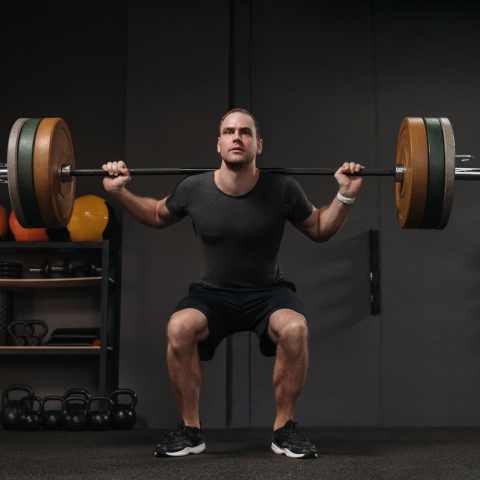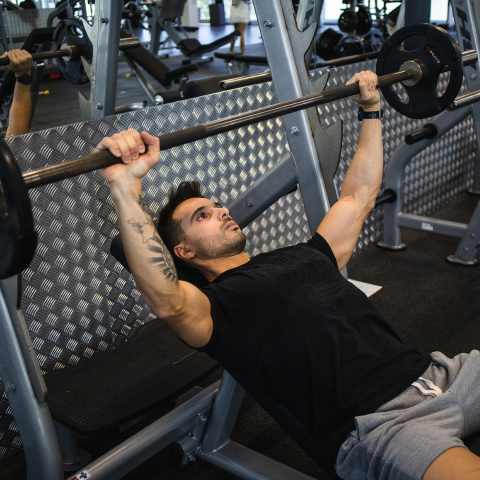Finding the perfect workout routine that fits seamlessly into your busy lifestyle can be challenging. Not everyone has four or five days per week to devote to their fitness. The good news is, you don't have to!
Enter, the 2-day split workout plan, a versatile and efficient approach that delivers the results you want in a fraction of the time.
In this article, we'll delve into 2-day workout splits, exploring their advantages, the best practices for designing a routine, and how they stack up against other workout split options. Whether you're a newcomer to the fitness scene or a seasoned gym-goer looking to optimize your workouts in less time, the 2-day split might be just what you need.
Table of Contents:
- What Is A 2 Day Split Workout?
- 3 Best 2 Day Split Workout Options
- Factors To Consider When Choosing A Training Split
- How To Decide Which 2 Day Split Is Right For You
- Guidelines For A 2 Day Workout Split
- Exercise Selection For 2 Day Workout Split
- FAQs

What Is A 2 Day Split Workout?
A 2-day workout split is a weight training routine that breaks your workouts into two weekly sessions. It's a straightforward approach for those with limited time or who prefer a less time-consuming workout schedule.
There are various ways to set the program up. The most popular method is an upper-lower split. A two-day upper-lower routine has one day devoted to upper-body workouts, with the second day lower body. One of the advantages of this style of programming is it ensures both the upper and lower body muscle groups get enough volume.
Another option is to perform full-body workouts. With a full-body setup, you mix upper and lower-body training in the same workout. There are a few advantages to this style. One, you can increase training frequency. Instead of only performing an exercise or muscle group once per week, a 2-day full body routine would allow you to do it twice a week.
Full-body training is also easier to program. Some exercises like deadlifts, abs, core, and conditioning movements don't fall neatly into an upper or lower body routine. However, with full-body training, that is not an issue.
Lastly, a two-day training split does not have to be limited to two days. If you prefer a three or four-day training split but don't have the time, you can adjust it to fit into two days per week. For example, if you enjoy a push-pull-legs routine, you can do push on day one, pull on day two, and legs on day one the following week.
Compared to other workout splits, like more extensive 4 and 5-day splits, the 2-day split offers efficiency. It allows for hard workouts while ensuring adequate rest, making it suitable for those with busy lifestyles or beginners seeking a manageable fitness routine. A well-structured two-day training routine can be highly effective. Quality training is about more than just doing as much as possible.
For additional information about workout splits, check out our article: What Is A Workout Split?

The 3 Best 2 Day Workout Split Routines
As mentioned, multiple ways exist to set up a two-day training split. This section will cover the three most common - the upper/lower, the full body, and the push-pull legs.
1) 2 Day Upper / Lower Split:
The two-day upper-lower split divides the body into two weekly training sessions. Day one is devoted to the upper body, while day two is for the lower body. With this setup, the entire body gets trained once per week.
An upper/lower split allows you to distribute your workouts evenly between your various upper body muscles (chest, shoulders, back, arms) and lower body (quads and hamstrings), promoting balanced muscle development. You also have the flexibility to incorporate a wide range of exercises for both the upper and lower body, which can help prevent boredom and plateaus.
While upper/lower splits promote balanced development, they may not address specific upper body weaknesses or goals as effectively as more specialized splits with isolation exercises (e.g., push-pull-legs or body part splits).
Upper-Lower Workout Program
An upper-lower routine is simple to set up. You can perform the two workouts any day during the week, even on back-to-back days if you have to.
Day 1: Upper Body
|
Exercise |
Sets |
Reps/ RPE |
|
Bench Press |
3 |
4-6 reps |
|
Barbell Row |
3 |
8-10 reps |
|
Overhead Barbell Press |
3 |
6-8 RPE |
|
Pull ups |
3 |
10-12 reps |
|
Dips |
3 |
8-10 reps |
|
Preacher Curl |
3 |
10-12 reps |
Day 2: Lower Body + Abs
|
Exercise |
Sets |
Reps |
|
Back Squat |
3 |
6-8 reps |
|
Romanian Deadlift |
3 |
8-10 reps |
|
Leg Press |
3 |
10-12 reps |
|
Leg Curl |
3 |
10-12 reps |
|
Standing Calf Raise |
3 |
8-10 reps |
|
Hanging Leg Raise |
3 |
10-12 reps |
2) 2 Day Full Body Workout Split:
The two-day full-body workout plan is what it sounds like. You do a full-body workout in both weekly training sessions, mixing upper and lower body exercises. When following a 2 day split full body workout, you can hit each body part or exercise multiple times weekly.
Full-body routines work well for strength, muscle hypertrophy, or functional training. One of the most significant benefits of this style is since you're training multiple muscle groups in each session, you can perform exercises more frequently throughout the week. For example, instead of only bench pressing once a week on an upper body day, you can bench during both workouts. This increased frequency can lead to faster strength improvements, especially for beginners.
The one downside is time. Two full body workouts can take longer than other workout splits to target all major muscle groups adequately.
2-Day Full Body Split Program
Get ready to feel the burn, as this program contains all of my favorite compound lifts and some awesome isolation exercises as well.
Day 1: Full Body
|
Exercise |
Sets |
Reps/ RPE |
|
Back Squat |
3 |
6-8 reps |
|
Bench Press |
3 |
6-8 reps |
|
Romanian Deadlift |
3 |
4-6 reps |
|
Overhead Barbell Press |
3 |
6-8 RPE |
|
Barbell Curl |
3 |
8-10 reps |
|
Triceps Press Down |
3 |
10-12 reps |
|
Hanging Leg Raise |
3 |
10-12 reps |
Day 2: Full Body
|
Exercise |
Sets |
Reps |
|
Close Grip Bench Press |
3 |
4-6 reps |
|
Barbell Row |
3 |
8-10 reps |
|
Bulgarian Split Squat |
3 |
10-12 reps |
|
Leg Curl |
3 |
10-12 reps |
|
Standing Calf Raise |
3 |
8-10 reps |
|
Dumbbell Alternating Curl |
3 |
8-10 reps |
|
Dumbbell Side Raise |
3 |
10-12 reps |
3) 2 Day Push Pull Legs Split:
The push-pull legs (PPL) training split is one of the most popular training splits in existence. People love it for its versatility and effectiveness.
It works by splitting the body up into three workouts. Workout one focuses on upper body push exercises, including the chest, shoulders, and triceps. Day two focuses on upper body pulling exercises, including the back and biceps. Lastly, day three is leg day.
Although the PPL split traditionally requires three training days per week, with some creativity, it is possible to work as a two-day split. The key is to expand the week beyond seven days.
A breakdown could look like this:
Week 1:
- Day 1: Push
- Day 2: Pull
Week 2:
- Day 1: Legs
- Day 2: Push
Week 3:
- Day 1: Pull
- Day 2: Legs
The downside to this style of split is it takes more than one week to hit all of your muscle groups.
Push-Pull-Legs Workout Program
Following this plan, you would perform your pull and push workouts in week one, and then in week two, you would start with legs, and circle back to pull. Week three would begin with a push day.
Day 1: Pull
|
Exercise |
Sets |
Reps |
|
Pull ups |
3 |
8-10 reps |
|
Chest Supported Row |
3 |
10-12 reps |
|
Neutral Grip Lat Pulldown |
3 |
10-12 reps |
|
Dumbbell Row |
3 |
8-10 reps |
|
Dumbbell Alternating Curl |
3 |
10-12 reps |
|
Barbell Curl |
3 |
10-12 reps |
Day 2: Push
|
Exercise |
Sets |
Reps |
|
Barbell Bench Press |
3 |
6-8 reps |
|
Incline or Decline Dumbbell Press |
3 |
8-10 reps |
|
Cable Crossover |
3 |
10-12 reps |
|
Seated DB Shoulder Press |
3 |
8-10 reps |
|
Dumbbell Side Raise |
3 |
10-12 reps |
|
Dumbbell Overhead Triceps Extension |
3 |
10-12 reps |
Day 3: Legs (On Week 2)
|
Exercise |
Sets |
Reps |
|
Barbell Back Squat |
3 |
6-8 reps |
|
Leg Press |
3 |
8-10 reps |
|
Barbell Romanian Deadlift |
3 |
6-8 reps |
|
Seated Leg Curl |
3 |
8-10 reps |
|
Leg Press Calf Raise |
3 |
10-12 reps |
|
Decline Sit Up |
3 |
10-12 reps |
7 Factors To Consider When Choosing A Training Split
Choosing the right training split is essential for achieving your fitness goals effectively and efficiently. Several factors should be considered when making this decision. Here are a few tips to help you choose the right training split for you.
1) Fitness Goals:
Of course, what you want to accomplish will determine what the best training split is. For example, if your primary goal is to improve muscular strength, consider splits that allow you to target specific exercises and muscle groups with higher intensity and frequency.
On the other hand, if your goal is to build muscle mass, you want a split that allows you to perform more training volume. In this case, intensity and frequency are less critical for a goal to gain muscle.
If your focus is on fat loss and lean muscle, opt for a split incorporating strength training and cardio. Full-body workouts or circuit-style routines with compound exercises can help maximize calorie burn as well.
2) Experience Level:
Those new to fitness may benefit from full-body workouts or simple routines like a 2-day split to build a strong foundation and develop quality habits.
Experienced individuals can benefit from more complex splits. However, even advanced lifters can maintain or even gain strength and muscle on a well-constructed 2-day training routine. This style of training can come in handy when time is limited.
3) Age and Recovery Ability:
Younger, more resilient individuals can handle higher training volumes, allowing more frequent workouts. However, because they can handle more volume doesn't mean they need it. Younger lifters should aim to get the most out of 2 and 3-day training splits before adding days.
As you age, muscle recovery becomes increasingly important. Older lifters should consider fewer training days and more rest between workouts to allow for adequate recovery.
4) Time Availability:
Time is one of the most common excuses for why people can't workout. However, it's rarely a valid concern. Everyone can spare two days per week. Don't let time be the reason why you don't make progress.
5) Gym Equipment:
What training equipment you have access to will also dictate your training schedule. If you train at a big commercial gym, use your gym's equipment variety to create a split incorporating different exercises and equipment. At a fully equipped gym, you have endless options for workouts.
If you train at home, it can be a great way to save time by not having to commute. Additionally, you can save time by setting up supersets and circuit training without bothering other members.
6) Preference:
Enjoyment is one area of training that needs to get more attention. Choose a workout split that you enjoy and can stick with. If you dislike a particular type of workout, it may lead to inconsistency.
Regarding consistency, some people thrive on variety, while others prefer routine. Customize your split to align with your preference.
7) Sports Training:
Many people assume athletes must spend every day in the weight room. Lifting weights is only one part of an athlete's weekly routine.
If you're training for a specific sport or activity, your split should compliment the sport, not detract from it. When participating in a sport multiple times per week, a 2-day workout split might be all you need.

How To Decide Which 2 Day Workout Split is Right For You
Deciding which two-day workout split is best for you primarily depends on preference. All three options can be highly effective. However, you will get the best results following the one you enjoy.
Beyond that, your goals matter, too. For building muscle, an upper-lower or push-pull-legs split works best. However, it's hard to beat full-body training if you're looking for a strength training program or functional training.
Of course, it's not an either-or question. You don't have to follow one training split for the rest of your life. You can try one for a bit, see how you like it, and change to one of the other splits if you want.

Guidelines For A 2 Day Workout Routine
One of the keys to efficient training is intensity. Training intensity refers to how close to failure you get on any set.
With only two workouts per week, each session becomes highly valuable. High-intensity training ensures you maximize these limited opportunities to stimulate muscle growth and strength gains.
Intensity is also a critical component of the overload principle, essential for progress. To continue making gains, you must progressively overload the intensity of your workouts, whether by lifting heavier weights, performing more repetitions, or reducing rest periods.
I recommend using a logbook to keep track of your sets, reps, and amount of weight used during your workouts. Try to "beat the logbook" each workout session by performing better than last time.

The Best Exercises For A 2 Day Workout Split
Here is a list of the best exercises for each muscle group. Feel free to mix and match these when creating a two-day training routine.
Best Chest Exercises:
|
Exercise |
|
Barbell Bench Press |
|
Dumbbell Bench Press or Dumbbell Incline Bench Press |
|
Machine Chest Press |
|
Cable Crossovers |
|
Pec Deck |
|
Pushups |
Best Back Exercises:
|
Exercise |
|
Barbell Row |
|
Lat Pulldown (Various grips) |
|
Pullups |
|
Dumbbell Row |
|
Chest Supported Row |
|
Seated Cable Row |
Best Shoulder Exercises:
|
Exercise |
|
Overhead Barbell Press |
|
Seated Dumbbell Shoulder Press |
|
Dumbbell Side Raise |
|
Cable Side Raise |
|
Reverse Pec Deck |
|
Dumbbell Front Raise |
|
Cable Face Pull |
Best Biceps Exercises:
|
Exercise |
|
Barbell Curl |
|
Dumbbell Alternating Curl |
|
Dumbbell Hammer Curl |
|
Dumbbell Incline Curl |
|
Preacher Curl |
|
Cable Curl |
Best Triceps Exercises:
|
Exercise |
|
Close Grip Bench Press |
|
Dips |
|
Lying Triceps Extensions |
|
Cable Press Down |
|
Dumbbell Overhead Extension |
|
Dumbbell or Cable Kickback |
Best Legs Exercises:
|
Exercise |
|
Barbell Back Squat |
|
Leg Press |
|
Deadlift |
|
Romanian Deadlift |
|
Leg Extension |
|
Leg Curl |
|
Hack Squat |
|
Bulgarian Split Squat |
FAQs
Here are some common answers to questions about 2-day workout splits.
What's better, a 2 or 3-day workout split?
Choosing between a 2-day and 3-day workout split depends on individual goals and preferences. A 3-day split allows for more targeted muscle work and may be better for muscle hypertrophy, while a 2-day split can still be effective for overall fitness with a well-designed routine.
Are 2-day workout splits effective?
Yes, 2-day workout splits can be effective for general fitness and maintenance. They are particularly suitable for beginners, those with limited time, or anyone looking for a simple workout routine.
Can you get ripped working out 2 days a week?
Yes, you can get ripped working out 2 days a week. However, getting ripped usually involves regular strength training, cardio, and a controlled diet. The diet part of the equation is critical.
Is 2 sets 3 times a week enough?
The effectiveness of a workout routine depends on the specific exercises, intensity, and individual goals. For some, two sets of a movement three times a week is sufficient, but those aiming for muscle growth or strength gains might require more volume and frequency.
Is training a muscle 1 or 2 times a week better?
As long as the overall weekly training volume (sets for a muscle group) is the same, it doesn't matter if you train a muscle once or twice weekly.
Is leg day once a week enough?
One hard leg workout per week, with enough training volume, is enough to gain strength and muscle.

2 Day Workout Split: A Summary
In conclusion, the 2-day workout split offers a versatile and time-efficient approach to achieving your fitness goals while accommodating various lifestyles and preferences. Whether just starting your fitness journey or seeking a more manageable routine, this split can be a valuable tool in your fitness arsenal.
Remember that thoughtful planning, consistency, and adaptability are the keys to success. As you embark on your fitness adventure with a 2-day split, don't hesitate to tweak and refine your routine to suit your evolving goals. With dedication and the right approach, this simplified workout split can pave the way to a healthier, stronger, and happier you.
If you would like to train more frequently, check out our Ultimate 3 Day Workout Split or the Ultimate 4 Day Workout Split. Interested in researching more split options? Head to our article on the 5 All-Time Best Workout Splits.

Prepare to maximize your gains with our exclusive 12-week hypertrophy training program. Choose between a 4 or 5 day training split and gain 2-12 pounds of muscle over 90 days...

0 Comments